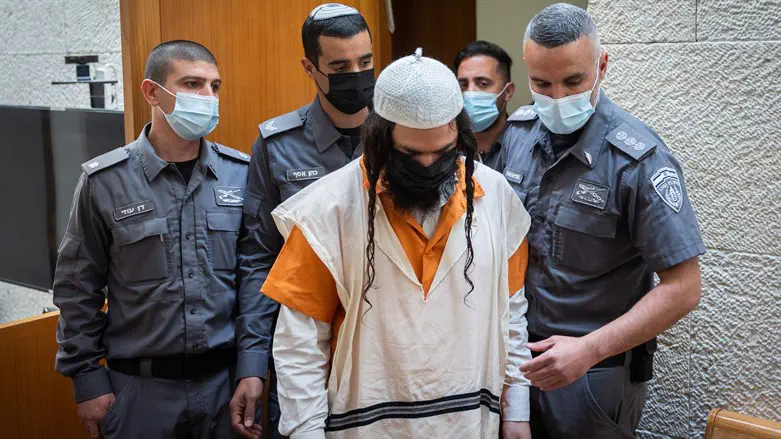
Amiram Ben Uliel, who was convicted by an Israeli court of the murders of several members of the Dawabshe family in the Palestinian-Arab village of Duma, has filed a lawsuit against the General Security Service (Shabak) demanding over five million shekels in compensation for the torture he underwent at their hands.
Ben Uliel's claim is being handled by attorney Menashe Yado of the Honenu legal aid organization.
In September, the Supreme Court rejected an appeal lodged on behalf of Ben Uliel, arguing that his confession was legally admissible even though lower courts had already invalidated two of Ben Uliel's three confessions, accepting his claim that he was tortured in order to extract them.
The new lawsuit details the torture suffered by Ben Uliel and the emotional damage he sustained as a result. Attorney Yado notes in the suit that until he is granted explicit permission to publicize the methods of physical torture used by the Shabak against his client, he will not detail them -- however, at this stage it is permissible to specify the severe damage sustained by Ben Uliel as a result of their use.
Among the suffering inflicted on Ben Uliel was the use of shackles for extended periods, which is illegal; being forced to take cold showers, being insulted and humiliated by his torturers, and spending a cold winter night with no coat.
The lawsuit also notes that deliberate damage was caused to Ben Uliel by offending his religious sensibilities when he was forced to listen to women singing for extended periods and to be touched on his body by a female.
Ben Uliel was also subjected to verbal threats, actual physical violence, and verbal threats using extreme profanity.
He sustained severe physical and emotional damage; furthermore, his rights to autonomy, to remain silent during interrogation, and to choose how to conduct his life without compulsion were all violated.
Attorney Yado also specifies the harms caused as a result of the torture inflicted on his client: "As a consequence of the torture, the defendant was forced to give an incriminating account, the veracity of which he denies to this day, an account which provided the sole basis for convicting him and sentencing him to life behind bars and which caused him actual emotional damage which endures to this day."
After submitting the lawsuit, attorney Yado stated: "The decision to physically torture Amiram blatantly breached the boundaries of protection that the law has established for people being interrogated, and this lawsuit comes to do corrective justice in this aspect with Amiram, and in the process to restore to their correct place all the prohibitions against the use of torture by the Shabak during interrogations."
